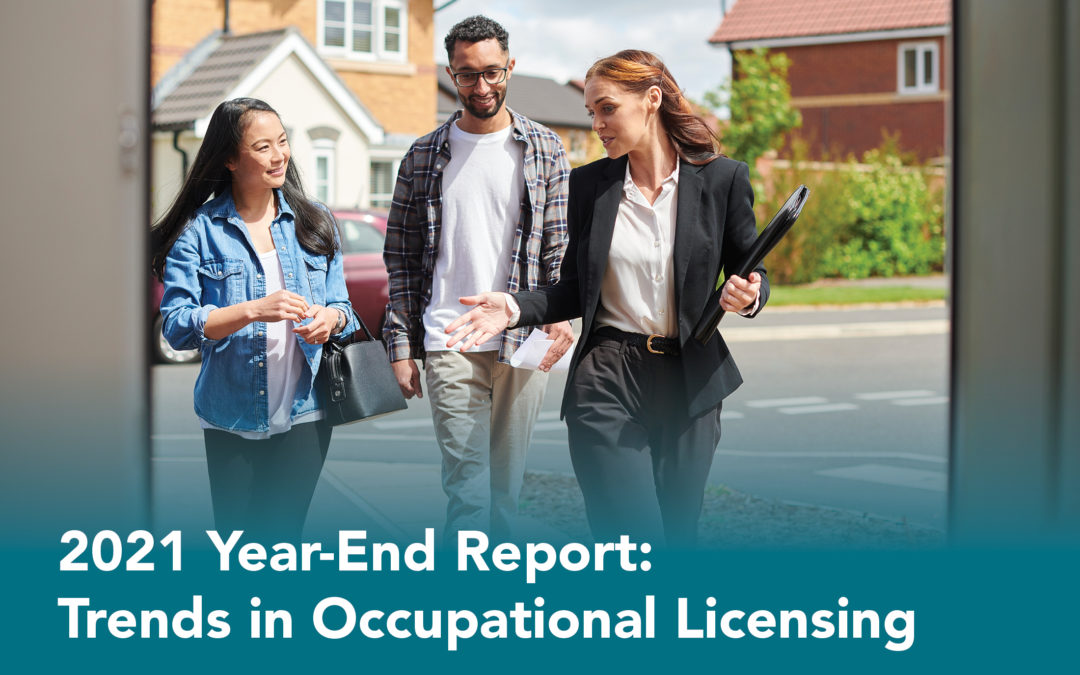At CAI, we traditionally think about occupational licensing as it pertains to community association managers. Recently, talk of occupational licensing reform is being discussed in nearly every industry of the U.S. economy—including for health care workers, service industry professionals, and those who work in the hospitality sector. As advocates supporting community association professionals, we believe there are overarching trends in occupational licensing that could have an impact on licensing (or not) of community association managers.
In 2021, 28 states introduced bills aiming to limit occupational regulations. Although not specific to community association management, these bills have an impact on state licensing regulations. Some proposed bills target an employee’s “right to work” and eliminate hurdles of employment, but most of the legislation is split into three categories: occupational licensing review and repeal, ex-offender re-entry, and reciprocity.
- The review and repeal legislation requires licensing boards/departments to review each occupation licensed and justify the need for the regulatory requirements. If the board/department does not provide substantive justification for the need of licensing to protect consumers, the licensing requirement faces the possibility of repeal.
- The ex-offender re-entry legislation is based on the Uniform Collateral Consequences model legislation that prohibits licensing boards from denying licensing based on ex-offender status.
- The reciprocity legislation requires licensing boards to recognize licenses held from other states unless there is something specific in the state (such as a state law for bar association) that may impact reciprocity.
Here is a summary of some of the occupational licensing legislation that was introduced this year:
Uniform Collateral Consequences Act/Ex-Offender Re-entry: This legislation requires state-regulated licensing boards to allow individuals with a criminal record to appeal to earn a license and/or to request a review of their application before starting the process to determine their occupational license eligibility. Some of these legislative proposals create moral turpitude exceptions. Eighteen states introduced legislation specific to ex-offender re-entry this year, with eight of them passing bills: Arizona, Colorado, Connecticut, Georgia, New Jersey, New Mexico, Tennessee, and Texas.
In Connecticut’s case, the law provides for automatic erasure of criminal records based on elapsed time since the felony and misdemeanor convictions, with exceptions only for family violence crimes and sexual offenses. It further prohibits private organizations (including certifying bodies and associations representing members whose profession requires state licensing) from discriminating against an individual based solely on their erased criminal record.
In Georgia, the law now prohibits a licensing board from refusing to grant a license to an applicant or revoking a license “due solely or in part” to their conviction of any felony or any crime involving moral turpitude, unless it directly relates to the occupation for which the license is sought or held. This does not apply to individuals convicted of a crime requiring registration on the state sexual offender registry.
Review and Repeal Licensing Requirements: This legislation requires the legislator and/or state licensing board to regularly review requirements to justify the need for licensing, by evaluating the barrier to entry and justification for consumer protection for each profession. Fifteen states introduced review and repeal legislation this year, with five of them passing bills: Arizona, Idaho, Louisiana, Texas, and West Virginia.
Licensing Requirement Bills Not Passed
Three states—Minnesota, Oklahoma, and Wyoming—introduced bills that would have relaxed occupational licensing requirements, but all failed to be passed. The Minnesota legislation completely prohibited occupational licensing, while the Wyoming legislation recognized the need to relax or change licensing requirements due to the COVID-19 pandemic. In addition, the Oklahoma bill would have created the “Oklahoma Certification Opportunity Act” to allow a private certifying organization—such as the Community Association Managers International Certification Board (CAMICB)—to voluntarily participate and register with the state government (based on specific criteria) to administer licensing requirements.
CAI’s current public policy supports self-regulation of the community association management profession, not a mandatory state license. Stay tuned for another blog post forecasting manager licensing legislation for 2022. For more information about community manager licensing, visit www.caionline.org/managerlicensing



